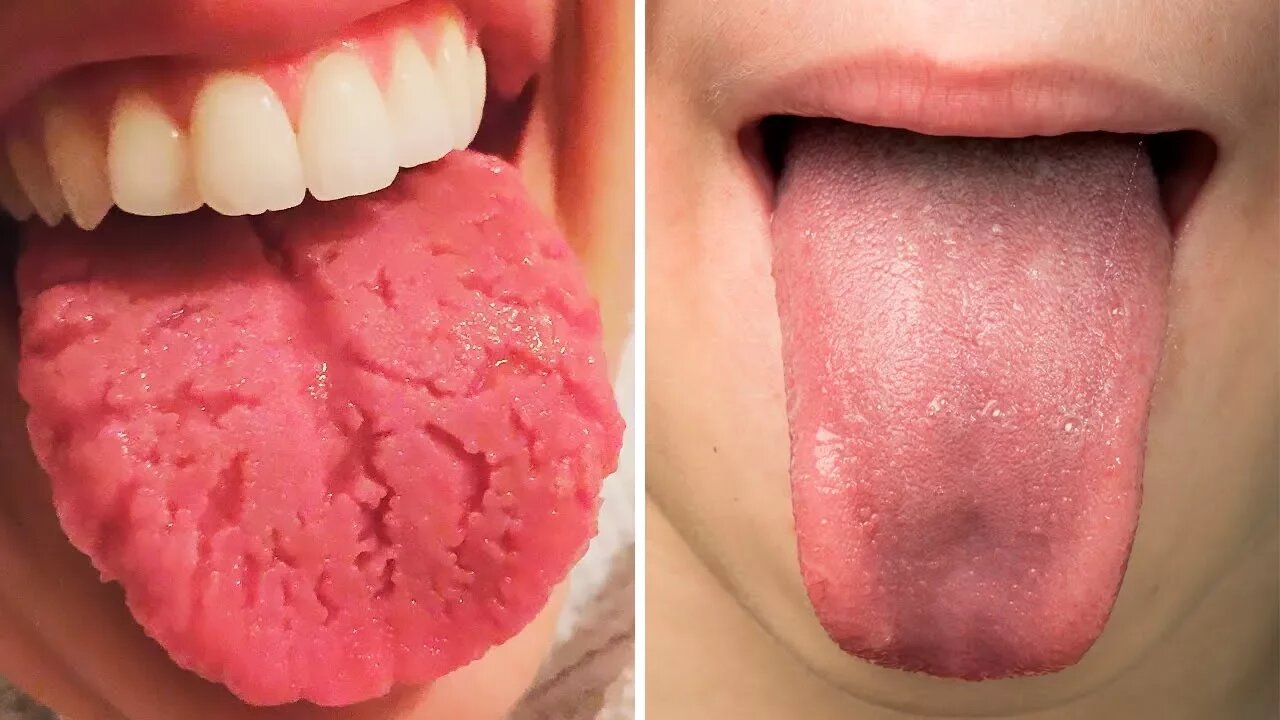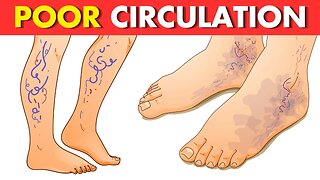Premium Only Content

What Your Tongue Says About Your Health
Most of us don't think about our tongues on a daily basis. They’re one of those important body parts that are normally overlooked: until we eat something really hot.
Just like other body parts, the tongue can show signs of sickness or trauma to tell us that something isn't right.
Being able to recognize the seven signs associated with your tongue can help you know when something is wrong:
If your tongue is cracked
A crack in the middle of your tongue can develop with age. If you notice any small cracks in your tongue, they’re probably harmless. They can be passed down genetically. However, if the crack is accompanied by swelling of the face or lips, you should consult a doctor. It might be an indication of a rare disease called Melkersson-Rosenthal Syndrome.
If your tongue is covered in a thick cheese-like lining
A thick, white coating on your tongue is a sign of a fungal infection called oral candidiasis. It’s more common among children and teens, but it can also happen to people who wear dentures, who have a weak immune system, or are taking antibiotics. If one of these applies to you, visit you doctor to figure out how to treat it.
If you have wounds on your tongue
Your tongue can be wounded due to biting it or due to small ulcers. No one really knows why most ulcers appear, but stress and acidic foods can bring them on and make them worse. If the sores don't disappear within two weeks, make an appointment with your doctor. These sores can also be a sign of oral cancer.
If your tongue has wavy edges
If the edges of your tongue are wavy, that may mean that your tongue is swollen. Swelling makes it press against your teeth more. That normally happens when something else is wrong with your body, like allergies, a thyroid problem, fever, or dehydration. Go see your doctor to find out what may be causing the swelling.
If your tongue is pink and a little bumpy
Big news: If your tongue is pink and bumpy, you don't have any reason to worry. The small bumps on your tongue are called papillae. They grab your food and make it easier to eat. They’re where your taste buds are. These taste buds control whether you like or dislike certain foods. They’re what make you taste sweet and sour.
If your tongue has white splotches
White splotches that appear on the side or underneath your tongue may be a sign of leukoplakia, a reaction to a long term irritation on your tongue. Constant irritation makes the cells from the affected area multiply more than usual, creating a white splotch. It may not always be worrisome, but it may be the starting point for cancer to develop later on. Check with your doctor to make sure it's nothing serious.
If your tongue is red and you have a fever
If your tongue or your child’s tongue turns a deep shade of red and is accompanied by a high fever, contact your doctor immediately. It may be a sign of scarlet fever – throat infections with a rash – or Kawasaki disease, which affects the blood vessels.
Kawasaki disease is an autoimmune, non-contagious disease that is found in children under eight years of age. If your child is experiencing these symptoms, take him to a doctor to make sure that he is treated correctly.
Some images available on Wikipedia.
----------------------------------------
Facebook: https://bit.ly/38BWbw3
Pinterest: https://bit.ly/2Irvwa6
Disclaimer: The materials and the information contained on Natural Cures channel are provided for general and educational purposes only and do not constitute any legal, medical or other professional advice on any subject matter. These statements have not been evaluated by the FDA and are not intended to diagnose, treat or cure any disease. Always seek the advice of your physician or other qualified health provider prior to starting any new diet or treatment and with any questions you may have regarding a medical condition. If you have or suspect that you have a medical problem, promptly contact your health care provider.
-
 4:50
4:50
Natural Cures
1 year ago $1.16 earned5 Warning Signs of Poor Circulation and How to Fix It
3.47K1 -

MyronGainesX
1 day ago $19.40 earnedFed Explains Rollin 60s Crips Gang RICO Operation Draw Down Arrests!
67.5K8 -
 54:14
54:14
Sarah Westall
5 hours agoCIA Coups, Coverups and Torture: CIA Whistleblower & Former Intelligence Officer John KiriaKau
73.8K52 -
 2:12:04
2:12:04
Nerdrotic
8 hours ago $14.45 earnedPyramid Structures, The Younger Dryas, and Academia with Marc Young | Forbidden Frontier #095
64.8K18 -
 2:10:53
2:10:53
vivafrei
13 hours agoEp. 256: Canadian Election! Illegals to Venezuela! Biden Attorney Found DEAD & MORE! Viva & Barnes
147K169 -
 1:04:32
1:04:32
Man in America
14 hours agoHOLD ON!! Sunglasses Can Give You SKIN CANCER?! Why's No One Talking About This?
40.3K15 -
 15:42
15:42
DeVory Darkins
10 hours ago $34.58 earnedBernie SNAPS when asked about AOC replacing Schumer
83.6K246 -
 19:37
19:37
Stephen Gardner
10 hours ago🔥"VOTERS SHOULD BE PISSED" Trump's Agenda in Danger BECAUSE of lazy Republicans!
94.2K96 -
 7:59:56
7:59:56
SpartakusLIVE
9 hours agoGames w/ Fifakill & Lien || The Saturday SPARTOONS you've always desired
77.9K11 -
 5:40:08
5:40:08
RamrodJenkins
11 hours agoSunday Funday! Doing more quests on Avowed!
90.2K4